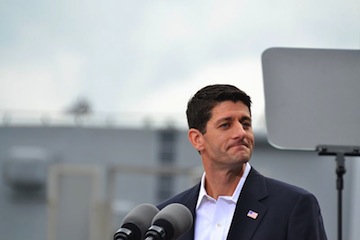The L-Word: Libertarianism

Rep. Paul Ryan shortly after the official announcement of his selection as Mitt Romney's running mate. Credit: Flickr.
The night before Mitt Romney announced that he had chosen Wisconsin congressman Paul Ryan as his running mate, Michael Gerson, an op-ed columnist, identified Ryan as "the intellectual leader of his party." The next day pundits echoed Gerson's judgment. They called Ryan an up-and-coming "superstar," the G.O.P.'s premier communicator of big ideas.
What are those ideas? Which values shape them?
Paul Ryan's position on government's role in the economy principally reflects a libertarian point of view, but that influence receives very little attention in the media's reactions to his emergence as a GOP vice-presidential candidate. Commentators are reluctant to use the L-word. Instead, they focus on details about Paul Ryan's budget proposals. They discuss Ryan's interest in changing Medicare, cutting taxes for wealthy citizens and corporations, and reducing federal spending on social programs.
Yet the libertarian ideas that justify these policies have become influential in modern GOP politics.
We are speaking here of libertarianism in a broad, generic sense. There is no single libertarian manifesto to which all devotees adhere. People who identify with libertarianism frequently disagree with each other on small points of interpretation. Few Republicans openly identify themselves as libertarians, but many of them are enthusiastic about the movement's concepts.
Libertarians stress the importance of an individual's freedom to pursue self-interest with a minimum of interference from the State. They emphasize "free markets," "property rights," and "individual responsibility." Libertarians put a premium on liberty, arguing that people should generally be allowed to do what they wish in their personal and business affairs as long as those activities do not harm others. While libertarians tend to view individual freedom in positive light, they often characterize governmental activities in sharply negative terms. Government should protect citizens from domestic crime and foreign aggressors, they argue. It needs to maintain a basic infrastructure, building roads and bridges. But libertarians are suspicious of many other kinds of State intervention. They frequently oppose taxes, Washington's regulation of business affairs, and federal spending on entitlement programs
When libertarians identify economists who influenced their thinking, they mention scholars that impressed Paul Ryan. The Republican contender says he was inspired during his college days and in later years by major figures of "Austrian school" of economics such as Ludwig von Mises and Friedrich von Hayek. Ryan was also enthusiastic about the writings of Milton Friedman, a Nobel Prize-winner and leader of the Chicago school of economics. Mises, Hayek, and Friedman criticized State intervention in markets.
Ayn Rand, another favorite of libertarians, played an important role in Paul Ryan's intellectual growth. Rand, a controversial philosopher, playwright and novelist, published non-fiction works with provocative titles such as The Virtue of Selfishness and Capitalism: The Unknown Ideal. Her most influential work was Atlas Shrugged, a novel. The book praised rugged individualism exemplified by talented and productive citizens. It criticized mediocrity and collectivism.
"I grew up on Ayn Rand", Paul Ryan told the Atlas Society, an organization that promotes Rand's ideas. She "taught me quite a bit about who I am and what my values are and what my beliefs are." Ryan encouraged interns in his congressional office to read Atlas Shrugged. He learned, however, that public expressions of praise for Ayn Rand's viewpoints can hurt an aspiring office seeker. In recent years Ryan has tried to distance himself from Ayn Rand. He expressed disapproval of her atheism and idiosyncratic philosophy, Objectivism.
Libertarian-minded politicians also try to avoid close association with Ayn Rand, and many of them avoid direct association with the label as well. They are aware that religiously-oriented conservatives are uncomfortable with libertarian stands on social issues (libertarians tend to reject activist government in matters of personal choice such as in abortions, drug use, and gay marriage). Also, libertarianism arouses suspicion among people on the Right who are fearful of "isms" -- communism, socialism and other ideologies that smack of radicalism.
Libertarianism now operates largely as a stealth ideology in Republican affairs. The movement's perspectives, especially as they relate to the economy, are of growing interest to movers and shakers in the GOP, but those individuals are reluctant to advertise their attraction. Consequently, libertarianism typically functions informally.
Below the surface of American politics libertarianism is abundantly evident. Its perspective can be detected in the Tea Party movement, which has been funded and organized to a large degree by FreedomWorks, headed by a libertarian and former congressional leader, Dick Armey. The commitment of many GOP congressmen to reject all tax increases has been influenced by Grover Norquist, a powerful figure in Washington affairs who was inspired by libertarian values. The libertarian perspective bolsters the arguments of Republicans who defend tax cuts for the rich ("job creators" in GOP rhetoric). It also defends huge cuts in programs that create public safety nets for the masses.
The libertarian perspective excited Paul Ryan's interest in privatizing Social Security (Ryan muted that idea recently, probably to avoid touching the "third rail" of American politics). Libertarianism also influenced Ryan's campaign to privatize aspects of Medicare by steering many younger citizens toward a voucher system.
Paul Ryan's quick rise to his party's second position in the presidential race symbolizes the growing prominence of this previously obscure philosophy and political movement. Overt libertarianism engages only a small minority of devotees in Washington these days, but stealth libertarianism has become a major force in the nation's affairs.
